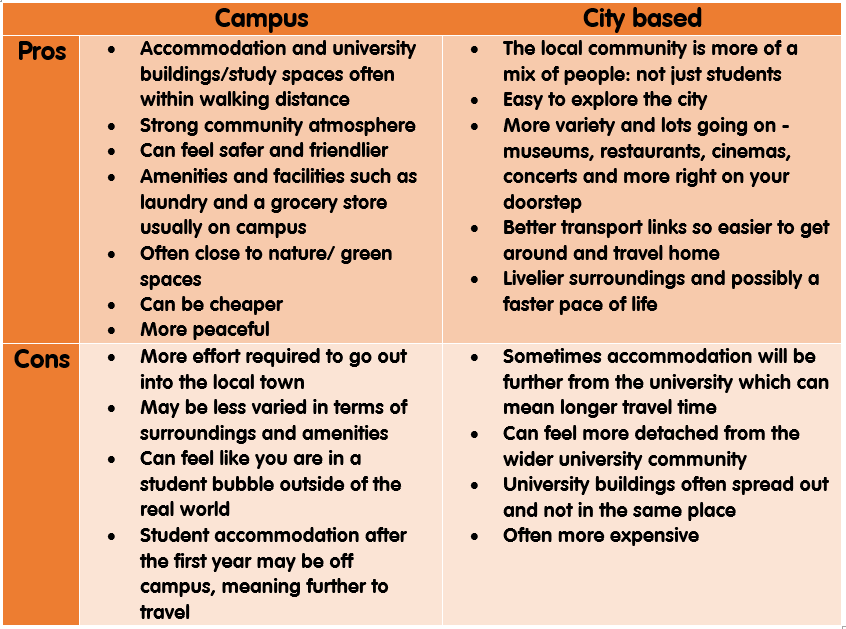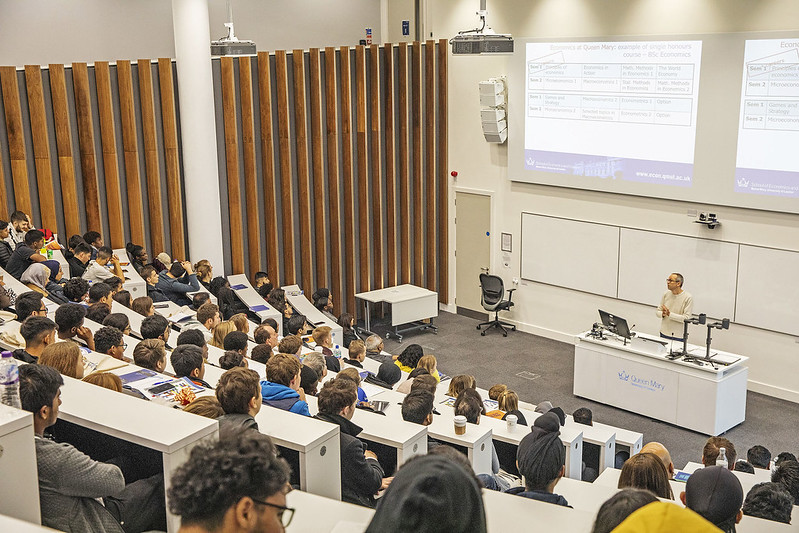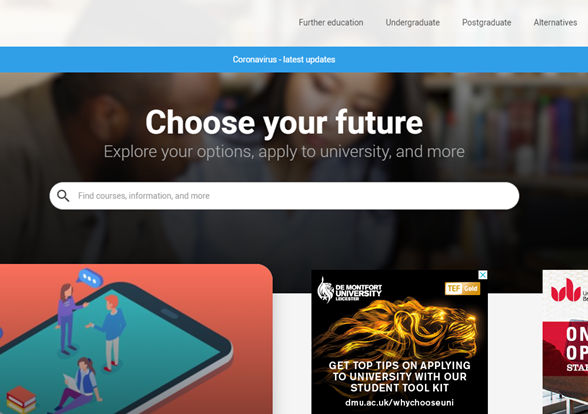Choosing the right university for you
by Safiya Zaloum & Charlotte Morgan, with contributions from Emma Elliott, Ashraya Harish, Lorena Lucioli & Carola Bigogno

After you have decided what subject you want to study at university, the next step is to decide where to study. There are many factors to consider when choosing which universities to apply to; here we share those that we think are the most important to consider, based on our team members’ experiences.
Course structure and content
The structure and content of courses with the same name can vary widely between different universities. It is important to do some thorough research into compulsory and optional modules and how the course will be delivered. Don’t assume from the course title that certain topics will be covered – make sure you find out how content differs between different universities. It is also worth looking at the module structure. For example, a medicine degree at Queen Mary University of London is based on a spiral curriculum, meaning core topics are covered three times across the five years of medical school, consolidating and building upon this knowledge. Healthcare degrees may all cover the same content due to regulations, but this content can be taught very differently at different universities. Some have a systems-based approach, which means you’ll learn by covering everything about one system at a time, for example the cardiovascular system. Others prefer to teach by discipline. In this case, modules would include anatomy, physiology, and pharmacology. You should consider what method suits you best.
You’ll also want to look at is the overall structure of the course. For medicine, you’ll want to consider whether you are keen on having clinical placement from the first year or would you rather learn all of the theory followed by all of your placements in the later years? Different medical schools may have differing approaches when it comes to clinical placements.
 For non-healthcare degrees, you might want to look at the flexibility of the course; can you select some of your modules or can you easily change to another similar course after the first year? Many bioscience degree options share a common first year, allowing students to change their specific degree title after their first year. For example you may begin your studies working towards a biology degree, but, having shared all first year teaching with zoologists, ecologists and botanists, you could then change your degree title to ecology. Something else to consider is whether the course is very theory heavy, or are there more practical elements? Do you learn best through lectures or smaller group teaching? Have a look at how the course is taught and think about your personal learning style. Keep in mind that studying at university level will present some new challenges, so don’t be put off by something that sounds difficult while you investigate the different teaching and assessment styles at different universities.
For non-healthcare degrees, you might want to look at the flexibility of the course; can you select some of your modules or can you easily change to another similar course after the first year? Many bioscience degree options share a common first year, allowing students to change their specific degree title after their first year. For example you may begin your studies working towards a biology degree, but, having shared all first year teaching with zoologists, ecologists and botanists, you could then change your degree title to ecology. Something else to consider is whether the course is very theory heavy, or are there more practical elements? Do you learn best through lectures or smaller group teaching? Have a look at how the course is taught and think about your personal learning style. Keep in mind that studying at university level will present some new challenges, so don’t be put off by something that sounds difficult while you investigate the different teaching and assessment styles at different universities.
League Tables
Universities across the UK are ranked according to things like student satisfaction, entry requirements and graduate prospects. You can find out more about university rankings on the Complete University Guide and Times Higher Education websites. Attending a high-ranking university may be something that’s important to you, but the league tables don’t mean everything when choosing a university, and should only be considered alongside all the other factors discussed in this blog post.
You may have also heard of The Russell Group – this is a self-selected group of 24 universities in the UK – find out more about these here. They all have a focus on research and have a reputation for high academic achievement. There are some benefits to attending Russell Group universities; lecturers will often be carrying out research in their area of expertise and bring this into their teaching. This can be a real positive, and often you will be taught by people who are incredibly knowledgeable and passionate about their subject.
These are not necessarily the top 24 universities in the UK; rather the Russel Group is a group of universities that have a shared focus as well as ranking highly in league tables. The Russell Group is awarded two thirds of all research grants which should be appealing to you if you are interested in doing some research as part of a project or dissertation in your final year. These institutions generally have higher student satisfaction and lower dropout rates than average, but they are not the only universities that are research-led, or that offer high quality teaching and high student satisfaction. It’s important to consider the full picture when finding the right university for you.
Location
 Location is a really important factor to keep in mind, since we’re not just talking about where you are studying, but where you are living for three years or more. Do you want to be a student in a big, vibrant city, or a quieter university town? Do you want to be somewhere near nature? Is nightlife and access to culture, such as museums and concerts, important to you? Think about which locations will facilitate the lifestyle you want as a student. Your personal preference is important and is a good way of narrowing down your university options if you feel strongly one way or another. Location can also impact on your academic experience, for healthcare especially, as the patient population varies in different locations, and this can impact your experience on placements. Cities often have more diverse patient populations so this might be something to consider.
Location is a really important factor to keep in mind, since we’re not just talking about where you are studying, but where you are living for three years or more. Do you want to be a student in a big, vibrant city, or a quieter university town? Do you want to be somewhere near nature? Is nightlife and access to culture, such as museums and concerts, important to you? Think about which locations will facilitate the lifestyle you want as a student. Your personal preference is important and is a good way of narrowing down your university options if you feel strongly one way or another. Location can also impact on your academic experience, for healthcare especially, as the patient population varies in different locations, and this can impact your experience on placements. Cities often have more diverse patient populations so this might be something to consider.
Whether you are planning to stay at home with your family, or move out will of course influence your choice of university. If you are staying at home, you’ll need to consider which options are within a commutable distance. If you are moving out, think about how often you’d like to visit home, and whether transport options for getting home are reliable and affordable.
Campus vs city-based
 Some universities are campus based, for example the University or York or the University of Warwick, where the university facilities and student accommodation are based outside of the nearest city. On the other hand, many are city based, such as King’s College London or the University of Leeds. Most campuses have all of the universities facilities in one place such as labs, lecture halls and libraries as well as often having their own restaurants, laundry and sport facilities. On a campus, everything is within walking distance. City-based universities often have students spread out across more than one location and are immersed in the city, with lots of amenities and variety.
Some universities are campus based, for example the University or York or the University of Warwick, where the university facilities and student accommodation are based outside of the nearest city. On the other hand, many are city based, such as King’s College London or the University of Leeds. Most campuses have all of the universities facilities in one place such as labs, lecture halls and libraries as well as often having their own restaurants, laundry and sport facilities. On a campus, everything is within walking distance. City-based universities often have students spread out across more than one location and are immersed in the city, with lots of amenities and variety.
Here is non-exhaustive pros and cons table for campus and city based universities:

Some universities can give you the best of both worlds – they are based in smaller cities, where there is still plenty going on, but you can live somewhere quieter, greener, and often cheaper.
Accommodation
If you’re moving out of home, make sure you research accommodation options for your first year at university, and beyond. Most first year students will live in halls, i.e. accommodation provided by the university, and then move into privately rented houses from their second year with a group of friends. You’ll want to investigate both options to get a feel for the standard and affordability of accommodation. You’ll find lots of information on university websites, including virtual tours and videos. You might also want to check the proximity of amenities, such as supermarkets and transport links.
Finances and affordability
Another consideration when choosing where to study is finances. While you will be able to get a student loan to cover the full cost of your university tuition fees, you will need to think about how you are covering your living costs – accommodation, bills, travel, food, and anything else you need for uni. Alongside your tuition loan you can also apply for a maintenance loan from the Student Loans Company, but often this won’t cover all your day-to-day costs. This means it’s worth thinking about what your alternative sources of income will be, and researching the cost of living in different locations. Have a look at the grants and bursaries that universities offer – the amount of money available, and the criteria in order to be eligible for financial support, may vary between institutions. You could discuss with your family whether they will be able to offer any support, and explore part-time job options. Find out everything you need to know about student finances here.
Atmosphere
 This is not usually top of the list when it comes to thinking about factors important for picking a university, however the atmosphere can really make or break your university experience. You want to get good vibes about the place and feel like you would fit in with the student community at your chosen university. The student make up is often more diverse in city universities – this is something you might want to keep in mind.
This is not usually top of the list when it comes to thinking about factors important for picking a university, however the atmosphere can really make or break your university experience. You want to get good vibes about the place and feel like you would fit in with the student community at your chosen university. The student make up is often more diverse in city universities – this is something you might want to keep in mind.
Additionally, consider the academic balance; is the university completely focused on academic attainment or are extracurricular activities encouraged? Likewise, are students all about teamwork or are they ultra-competitive? Think about how you feel on these issues and try to find somewhere where the attitudes of the university and the student body fit with you. Some universities may come with a higher pressure environment than others. Think about which type of environment will allow you to thrive.
The best way to get a feel for what it would be like to live and study at different universities is to visit them and attend open days.
We’d advise you to attend as many open days as you can, both in person and virtual. If you can’t visit a university for any reasons, many have videos on their YouTube channels that will give you a feel for the campus and student life. For example, you can find out what it’s like to study at Queen Mary University of London here.
You can find more advice and resources for choosing a university here. Keep in mind that when you apply for university through UCAS, you can initially apply to four or five universities before narrowing these down to your top two. Good luck with finding the right university for you!


